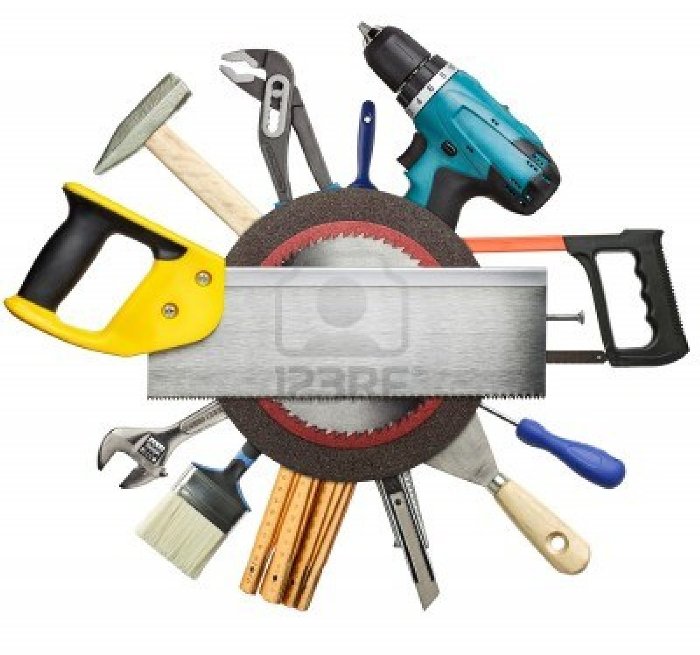Construction tools are vital, whether it is building houses, apartment buildings, hospitals, schools, or any other type of structure, the construction industry needs skilled workers. Not only does this include engineers and architects, but also carpenters and masons. There are often tasks that carpenters and masons can complete that do not require a great deal of skill or experience, making it possible for beginners to work on all manner of job sites. Although they need not be long-time professionals to handle certain construction responsibilities, beginners do need to have the right tools.
Choosing essential construction tools for beginners depends largely on what kind of materials with which they are planning to work. Many tools are designed for wood, drywall, stone, or concrete, among other materials. There are a few tools that have broad application in construction and beginners need to at least have these. For other construction tools, beginners need to consider a few factors in order to select the tools that they need.
Construction Tool Considerations for Beginners
Choosing the proper beginner construction tools requires careful consideration. Tools can be a big investment, even for those who are just starting out, so it is important that beginners choose the tools that they really need. By thinking about which medium they are going to work with and the usefulness and portability of a tool, beginners can put themselves on the path to selecting only essential tools for their skill level and needs.
Medium
One of the most important factors dictating the tool selection process is the medium with which a consumer plans to work. Two of the most common trades in construction are carpentry and masonry. Carpenters work with wood and masons with stone and concrete. There are numerous tools that are designed for each of these mediums, so carpenters should stick to wood tools and masons to stone and concrete tools. There are also a few general tools that beginners should own no matter the medium with which they are planning to work.
Usefulness
The usefulness of a particular tool is another important factor that beginners should consider. There are numerous tasks that construction beginners find themselves repeatedly performing. The tools for these tasks should therefore be at the top of their lists. Tools for specialized tasks should be lower priorities, with beginners considering these only as their skills grow. There are a few tools that beginners are likely to find themselves employing in diverse situations, making such tools more useful.
Portability
The portability of tools is also important towards determining whether they should be in a beginner’s collection. Portability tends to correlate with usefulness, as highly portable tools tend to be very useful. A beginner in construction likely does not have the capability to transport large machinery to a job site. In this case, it is important that beginners choose tools that they can carry in a light truck. Since big tools require greater transportation capability, there may be an added investment in vehicles that can carry such tools. Beginners are better served saving that money to buy other tools to expand the range of services that they can offer, saving larger expenses for when their business is established.
Categories of Beginner Construction Tools
Essential construction tools for beginners fall under three categories: general tools, wood tools, and masonry/concrete tools. All beginners should have general tools, no matter which medium they are planning to work with. Those planning to work with wood should purchase wood tools and those planning to work with stone and concrete should purchase masonry/concrete tools. All of the tools in each category are highly useful and most are very portable.
General Tools
General tools are useful no matter which trade a beginner is practicing. Beginners should therefore start building a collection with these tools since they are likely to find them in their hands frequently.
-
Measuring Tool
Measuring tools include tape measures and laser meters. The former are heavy duty, retractable rulers made of thin metal that is capable of measuring objects and distances of 100 feet in length. Beginners may not need quite that much tape, so there are many different options as far as maximum length goes. Tape measures also feature a long notch on one end of the tape to hold the tape to an object. Most also lock in place so that the tape does not retract while the user records a measurement.
Laser meters are even more convenient to use because they employ a laser beam to calculate lengths. They tend to be more expensive than tape measures are, but they can still be reasonably priced. Their added convenience can make the extra expense worthwhile.
-
Clamps
Clamps are relatively simple tools, but they are very versatile and useful. Beginners can use them to hold glued pieces of wood together while the glue dries or holding a piece of concrete or stone in place. Clamps are extra hands and extra hands are always useful on a construction job. Moreover, they are very strong hands, capable of holding objects where human hands would fail.
-
Knives and Cutters
All beginners should have some kind of knife or cutter. Utility knives are strong, sharp, and useful in situations that call for a heavy-duty blade. Swiss Army knives are more versatile, housing numerous small tools in a single handle. However, the tools tend to not be as strong as the blade of a utility knife is. Choosing one or the other depends on what the project calls for. Swiss Army knives are better suited towards highly detailed work and utility knives for situations that call for a strong, sharp blade.


Construction is a big industry sector. There are a lot many building projects that should be done on time. For this purpose, it is vital to have huge machines in hand to carry the job successfully.